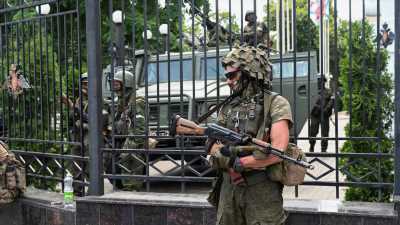Wagner chief agrees to halt advance on Moscow after striking deal with Putin

Save articles for later
Add articles to your saved list and come back to them any time.
Madrid: Russian warlord Yevgeny Prigozhin has called-off his paramilitary insurrection against the Kremlin’s armed forces just hours before a potential assault on Moscow, which had threatened to be the first coup attempt in the country for three decades.
Prigozhin, the founder of the Wagner group, said his convoy of troops, weapons and tanks would stop their journey towards Moscow on Saturday evening and return to their bases. It followed 24 hours of crisis in which the Kremlin scrambled to turn the capital into a fortress to fight off the rebels.
The dramatic about-face was brokered by Belarus leader Alexander Lukashenko, although the Kremlin did not immediately confirm it had agreed to the retreat of Prigozhin’s forces, which had seized control of the southern city of Rostov and shot down multiple Russian aircraft as part of the insurgency.
Prigozhin said his troops would turn back after advancing within 200 km of Moscow on a day when Russian President Vladimir Putin condemned Wagner’s uprising as “treason” and warned that the country risked tipping into civil war.
Putin had vowed to crush the rebellion and accused Prigozhin’s group of “treason” that posed “a deadly threat” comparable to the 1917 revolution that led to the collapse of imperial Russia. He said he had given “necessary orders” to tackle the Wagner paramilitary group and for “decisive measures” to recapture Rostov from the militia.
Fighters of Wagner private mercenary group stand guard outside the headquarters of the Southern Military District in the city of Rostov-on-Don on Saturday. Credit:
Prigozhin’s attempted mutiny followed months of increasingly bitter infighting between the warlord and the leaders of Russia’s armed forces, exacerbated by 16 months of war against Ukraine.
The conflict, launched in February last year, has failed to achieve its aims, hamstrung the country’s economy, cost tens of thousands of lives and created a dangerous patchwork of competing militias and security forces.
Lukashenko, who said he spent most of Saturday negotiating on the phone with Prigozhin and Putin, said an agreement was reached “that unleashing a bloodbath on the territory of Russia was unacceptable.”
Yevgeny Prigozhin said his men reached within 200 kilometres of the capital.Credit: AP
He said the deal offered to Prigozhin was “absolutely advantageous and acceptable”, and would involve unspecified security guarantees for Wagner. Lukashenko is Putin’s closest ally and allowed the Kremlin leader to use Belarus to launch part of Moscow’s war against Ukraine last year.
Prigozhin’s key demand for the past several months was the removal of the Defence Minister Sergei Shoigu and the chief of the general staff, Valery Gerasimov, who he blamed for mismanaging the war in Ukraine.
European nations and the United States were scrambling on Saturday to gain a clear picture of events inside Russia, trading information and analysis in hastily arranged video meetings as the political stability of a global nuclear power hung in the balance.
US President Joe Biden spoke by phone with French President Emmanuel Macron, German Chancellor Olaf Scholz and UK Prime Minister Rishi Sunak, according to a White House statement. The leaders discussed the situation in Russia and “also affirmed their unwavering support for Ukraine,” it said.
Prigozhin, the founder of the private army of mercenaries that has been fighting alongside the regular Russian army in Ukraine, said on his Telegram channel that he has agreed to “stop” the advancement of his troops towards Moscow.
“Right now the moment has come when blood could be spilled. Therefore, understanding all the responsibility for the fact that Russian blood will be spilled on one side, we are turning our convoy around and going back to our basecamps, according to the plan,” Prigozhin said in a voice memo.
He had previously said his Wagner forces no longer wanted to live “under corruption, lies, and bureaucracy”.
The agreement to dramatically de-escalate the situation came after Belarusian leader Alexander Lukashenko held talks with Prigozhin, according to Russian TV channel Rossiya 24. Earlier, the Wagner group said it had taken the Russian city of Rostov-on-Don and seized military facilities in Voronezh. Troops had also started to march toward Moscow after crossing the border from Ukraine.
There was speculation that Putin had fled the capital for his hometown of St Petersberg, although his spokesman, Dmitry Peskov, has said the Russian president remained in the Kremlin. Two aircraft, typically the only jets used by Putin for air travel, had both departed Moscow and were tracked headed toward the northwestern city of St Petersburg.
Fighters of Wagner private mercenary group transport a tank along M-4 highway, which links the capital Moscow with Russia’s southern cities, with smoke from a burning oil depot seen in the background, near Voronezh, on Saturday. Credit:
While Russia’s foreign ministry has warned western countries not to seek to exploit the uprising “to achieve their Russophobic goals”, Ukraine’s military announced on Saturday that it had retaken territory in the eastern Donetsk province that had been under Russian occupation since the Kremlin’s war against the country began in 2014.
Ukrainian president Volodymyr Zelensky said on social media it was clear there was “full scale weakness” in Russia.
“The longer Russia keeps its troops and mercenaries on our land, the more chaos, pain, and problems it will have for itself later,” he said in a post on Twitter.
“Everyone who chooses the path of evil destroys himself.”
Get a note direct from our foreign correspondents on what’s making headlines around the world. Sign up for the weekly What in the World newsletter here.
Most Viewed in World
From our partners
Source: Read Full Article


